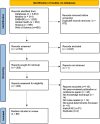Knowledge exchange in crisis settings: A scoping review
- PMID: 36827258
- PMCID: PMC9956070
- DOI: 10.1371/journal.pone.0282080
Knowledge exchange in crisis settings: A scoping review
Abstract
Background: Public health practice and efforts to improve the social determinants of health operate within a climate characterised by multiple and intersecting crises. This includes the Covid-19 pandemic as well as more protracted crises such as climate change and persistent social inequalities that impact health. We sought to understand and compare how knowledge exchange (KE) processes occur across different crises, and how knowledge on improving social determinants of health can be utilised at times of crisis to reduce health inequalities and strengthen public systems.
Methods: We conducted a scoping review to understand how KE on improving social determinants of health can occur across different types of crises (e.g. environmental, pandemics, humanitarian). Relevant studies were identified through electronic searching of Medline, EMBASE, Global Health, Scopus and Web of Science databases.
Results: We identified 86 studies for inclusion in the review. Most studies concerned pandemic or environmental crises. Fewer studies explored KE during technical (e.g. nuclear), terror-related or humanitarian crises. This may reflect a limitation of the searches. Few studies assessed KE as part of longer-term responses to social and economic impacts of crises, with studies more likely to focus on immediate response or early recovery stages. Exchange of research evidence or data with policy or practice contextual knowledge was common but there was variation in the extent that lay (public) knowledge was included as part of KE processes.
Conclusion: As ongoing crises continue with significant public health implications, KE processes should appropriately reflect the complexity inherent in crises and foreground health inequalities. Doing so could include the utilisation of systems or complexity-informed methods to support planning and evaluation of KE, a greater focus on KE to support action to address social determinants of health, and the inclusion of a plurality of knowledge-including lived experience-in planning and responding to crises.
Copyright: © 2023 McGill et al. This is an open access article distributed under the terms of the Creative Commons Attribution License, which permits unrestricted use, distribution, and reproduction in any medium, provided the original author and source are credited.
Conflict of interest statement
The authors have declared that no competing interests exist.
References
-
- World Health Organization. Closing the gap in a generation: health equity through action on the social determinants of health—Final report of the commission on social determinants of health. Geneva: World Health Organization, 2008. Contract No.: WHO/IER/CSDH/08.1.
Publication types
MeSH terms
LinkOut - more resources
Full Text Sources
Medical
Research Materials


